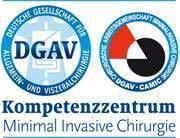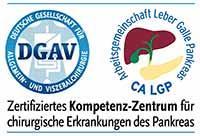Surgery Resection of Neuroendocrine Tumors (NETs) in Germany
Treatment prices are regulated by national law of the corresponding countries, but can also include additional hospital coefficients. In order to receive the individual cost calculation, please send us the request and medical records.

Department of General and Abdominal Surgery, Colorectal Surgery, Hepatopancreatobiliary Surgery, Hernia Surgery and Bariatric Surgery
The Department of General and Abdominal Surgery, Colorectal Surgery, Hepatopancreatobiliary Surgery, Hernia Surgery and Bariatric Surgery provides the full range of surgical treatment in its field of competence. The department's highly qualified surgeons annually perform about 2,000 surgical interventions. Extensive clinical experience allows the specialists to perform even particularly complex operations. The department’s advanced operating rooms serve for surgery to treat gastrointestinal diseases, liver, gallbladder, bile duct, pancreatic, rectal, anal and colon pathologies. The medical facility also successfully performs operations to treat hernias: inguinal, umbilical, and anterior abdominal wall hernias. In addition, the department's doctors deal with the surgical treatment of morbid obesity. Minor traumatic laparoscopic interventions are considered the gold standard, which guarantee a patient minimal risks and rapid postoperative restoration. Surgeons tell the patient in detail about their upcoming treatment and, in every possible way, support them in their recovery.







Department of General and Abdominal Surgery, Colorectal Surgery, Endocrine Surgery and Hernia Surgery
The Department of General and Abdominal Surgery, Colorectal Surgery, Endocrine Surgery and Hernia Surgery offers the full range of modern surgical interventions in the areas of its specialization. Every year, the medical facility performs more than 2,500 surgical interventions on an inpatient and outpatient basis. The department has vast clinical experience in the field of minimally invasive surgery, which allows the patient to avoid severe pain and prolonged hospitalization. In addition, the department offers robotic surgery using the most modern models of the da Vinci surgical system. The medical facility has the status of the Reference Center for Minimally Invasive Surgery and Hernia Surgery. Surgical treatment of cancer is one of the department's clinical priority focuses. A large number of da Vinci robot-assisted interventions are performed here for gastrointestinal cancers. The department holds a leading position in the use of the da Vinci surgical system in the treatment of rectal and sigmoid cancer patients. The operating rooms of the medical facility are equipped with the very latest technology, while hygiene and safety standards are at the highest level as well. Prior to surgery, the patient undergoes a comprehensive examination. Doctors also assess the risks of the upcoming operation and its expected results. With appropriate clinical indications, preference is always given to minimally invasive surgery.







Department of General, Abdominal, Transplant, Hepatopancreatobiliary, Colorectal, Endocrine, Bariatric Surgery and Hernia Surgery
The Department of General, Abdominal, Transplant, Hepatopancreatobiliary, Colorectal, Endocrine, Bariatric Surgery and Hernia Surgery provides the full range of services in the areas of its specialization and holds a leading position at the national and international levels in terms of the number of surgical interventions performed and their success. Of particular interest are operations for treating diseases of the bowel, stomach, esophagus, pancreas, liver, gallbladder, and bile ducts, and endocrine glands. The department's doctors have excellent skills in the surgical treatment of cancer, surgery for liver, kidney, pancreas, and small intestine transplants, and operations for morbid obesity. The department's operating rooms are the pride of the medical facility, since they have all the necessary technical options for performing operations with the da Vinci surgical system, image-guided interventions, and endoscopic surgical procedures, which are characterized by minimal trauma rates.






Neuroendocrine tumors (NETs) are relatively rare neoplasms that develop from the hormone-producing cells of the neuroendocrine system. The biological nature of the pathology is diverse, from benign to metastatic disease.
Overview
Neuroendocrine tumors (NETs) consist of the cells of the neuroendocrine system. These cells are located throughout the body and represent the endocrine system. They are simultaneously similar to nerve cells and cells of the endocrine glands. Since they can respond to signals from the outside or changes in the state of the body, they can produce hormones that perform different functions.
Neuroendocrine cells are not attached to any particular organ. Although neuroendocrine cancer most often occurs in the digestive tract, more rarely it can be found elsewhere in the body.
Neuroendocrine tumors can produce hormones that cause certain effects, and because of this the patients with neuroendocrine cancer experience specific symptoms. If patients with NETs experience symptoms caused by hormone production, then the tumors are called functioning. If hormones are not produced, it is a dysfunctional tumor.
Neuroendocrine cancer is rare and difficult to diagnose due to the lack of information about it in the clinical practice. In about 15% of patients with neuroendocrine cancer, the primary tumor remains undiagnosed. Neuroendocrine cancer is often diagnosed at the advanced stages. In up to 50% of cases, the tumor has time to spread to the surrounding tissues, to regional lymph nodes, and to give distant metastases.
Most often cancer occurs in the gastrointestinal tract, but it can also affect other organs. The peculiarity of neuroendocrine neoplasms is that tumor cells produce an increased amount of hormones, and because of this, patients with neuroendocrine cancer may experience specific symptoms.
According to statistical information, the number of patients with neuroendocrine neoplasms is increasing every year.
Symptoms
Since there are different types of neuroendocrine tumors, and they can be located in different organs, the patients with NETs experience very diverse symptoms.
There are three main groups of manifestations.
The first group of symptoms patients with NETs experience are symptoms common to any type of cancer, i.e. weakness, fatigue, decreased appetite, weight loss, etc.
The second group of symptoms is associated with the localization of the tumor and its size, compression of the neighboring anatomical structures, and dysfunction of the affected organ. Patients with NETs are usually disturbed by pain in a certain part of the body, nausea, chronic cough, diarrhea, frequent urination, and bleedings. With damage to the liver, bile ducts, and pancreas, obstructive jaundice may develop.
The third group of symptoms is caused by hormones that neuroendocrine cells produce. In this case, patients with neuroendocrine tumors may experience symptoms including:
- Diarrhea (stools more than three times a day)
- Thirst, hunger, frequent urination (signs of an increase in blood glucose levels)
- Fatigue, irritability, trembling, dizziness, convulsions (possible signs of a decrease in blood glucose levels)
- Peptic ulcer that does not respond to the conventional treatment
- Anxiety
- Skin rash
Diagnostics
In most cases, patients with neuroendocrine neoplasms have their diagnosis accidentally, when a person is being examined for another pathology. The tumor can be detected using visualizing diagnostic methods, including:
- Ultrasound scanning
- Endoscopic examinations: gastroscopy, colonoscopy, bronchoscopy
- Contrast-enhanced CT scan
Before the examination, the patients with suspected NETs need to drink a solution which helps to see the contours of the stomach and intestines clearly.
In patients with neuroendocrine tumors the diagnosis is confirmed with the clinical information from the biopsy. Having found a pathological formation, the doctor takes a sample of tissue for further laboratory examination. If the tumor is suspected to be a pheochromocytoma, a biopsy is used only in extreme cases and only in the specialized hospitals, as it carries serious risks.
Treatment options
Surgery resection is the most preferred method in the treatment of patients with neuroendocrine tumors. It is complemented by other techniques for a more stable effect of therapy. The location of the neuroendocrine tumor and its size determines how the surgery resection will be carried out. As a rule, surgeons choose the endoscopic method of surgery resection as the most sparing one.
In the treatment of patients with neuroendocrine tumors that are located in the abdominal cavity, a laparoscopic operation can be performed with punctures in the peritoneal region. In the treatment of patients with neuroendocrine tumors located in the lungs the intervention is performed with punctures along the ribs. This method avoids significant blood loss, minimizes the risk of infection, and also reduces postoperative recovery time.
If the lesion is located in a hard-to-reach region, surgery resection requires the utmost precision due to the risk of damaging nearby nerves or blood vessels. In such cases, the Da Vinci robotic surgeon can be used. This is the innovative method of surgery resection that is used in modern hospitals. Since the device can reach even areas which it is physically impossible to reach with a conventional scalpel, the tumor is removed as accurately as possible, without damaging healthy tissues.
Where can I undergo treatment of NETs with surgery resection in Germany?
Health tourism is becoming more and more popular these days, as medicine in Germany often ensures a much better quality of treatment with surgery resection.
The following hospitals show the best success rates in treatment of NETs with surgery resection:
- Academic Hospital Brothers of Mercy Munich
- University Hospital of Ludwig Maximilian University of Munich
- Charite University Hospital Berlin
- University Hospital Ulm
- University Hospital RWTH Aachen
You can find more information about the hospitals on the Booking Health website.
The cost of treatment in Germany
The prices in hospitals on the Booking Health website are relatively low. With Booking Health, you can undergo surgery resection treatment in Germany at an affordable price.
The cost of treatment varies, as the prices depend on the hospitals, the specifics of the disease, and the complexity of its treatment.
The cost of treatment of neuroendocrine tumors with surgery resection is 18,602-30,583 EUR.
You might want to consider the cost of possible additional procedures and follow-up care. Therefore, the ultimate cost of treatment in Germany may differ from the initial price.
To make sure that the overall cost of treatment in Germany is suitable for you, contact us by leaving the request on the Booking Health website.
How can I undergo treatment in Germany?
It is not easy to self-organize any treatment abroad. It requires certain knowledge and expertise. Thus, it is safer, easier, and less stressful to use the services of a medical tourism agency.
As the largest and most transparent medical tourism agency in the world, Booking Health has up-to-date information about the treatment with surgery resection in the best hospitals in Germany. We will help you select the right clinic taking into account your wishes for treatment.
We want to help you and take on all the troubles. You can be free of unnecessary stress, while Booking Health takes care of all organizational issues regarding the treatment. Our services are aimed at undergoing treatment with surgery resection safely and successfully.
Medical tourism can be easy! All you need to do is to leave a request on the Booking Health website, and our manager will contact you shortly.

